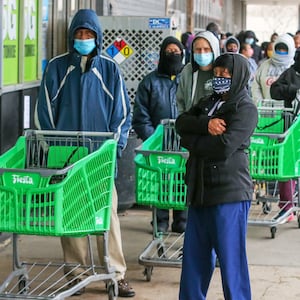For nearly two weeks now, tens of thousands of residents of Jackson, Mississippi, have gone without running water in their homes, leaving them with no clean drinking water and unable to bathe, cook, wash clothes, or flush toilets.
For professional chef Enrika Williams, who lives in south Jackson with four other family members, it was a scramble when news began circulating around Valentine’s Day of an unexpected cold front where temperatures dropped into the teens.
Worried her pipes might freeze, quick-thinking Williams filled up her bathtub in case of such an event. Unfortunately for her and thousands of others, the unseasonably frigid weather caused the city’s outdated water equipment–which can’t handle wintery conditions–to freeze and water lines to burst.
The result was dire, leading the city to issue a boil-water advisory and set up distribution sites for flushing water and bottled drinking water, with hundreds waiting in line with empty buckets for hours.
Williams would go the next 10 days with no running water in her home. She bought water wherever she could, shelling out $100 on bottled water to cook and clean with.
Nearby family members who happened to have water opened up their home so Williams, her mother, two siblings, and niece could wash their clothes and take a shower.
For flushable water, Williams had the idea to catch the melting snow from her home into waiting pails, as the weather soon turned a sunny 60 degrees Fahrenheit.
While Williams finally has water again, albeit trickling, she voiced her dissatisfaction with the city’s everchanging timeframe of when the water would be running again.
“The thing that became frustrating was the tone of accountability just wasn’t there,” Williams told The Daily Beast. “There was no plan that we could see. The press conferences were redundant. If you don’t know when it’s coming back, what is being done to help us?”
“There wasn’t anyone at the forefront who gave a damn, so to speak,” she added. “It makes you feel a lot of things. You just expect better.”
In Jackson, which has lost over 10 percent of its population since 2000, water problems are nothing new. Six years ago the city approved a 1 percent sales tax increase with the goal of updating all of its aging infrastructure, but the $15 million it generates annually is only a fraction of the $2 billion Mayor Chokwe Lumumba said the city will need. Long before the current crisis hit, one popular local t-shirt read “Welcome to Boil Water Alert, Mississippi.”
What’s different this time, residents say, is the sheer scale—the entire city is either without water or under a boil water alert.
More than a few residents have noted that the crisis has hit south and west Jackson hardest while leaving northeast Jackson, the one predominantly white corner of this 80 percent Black capital city, relatively unscathed. Over the past several days, Laurie Bertram Roberts, who runs the Mississippi Reproductive Freedom Fund, has used the fund to distribute more than 130 cases of water to residents, with plans to deliver another 80 tomorrow.
“Part of the problem is that it’s everywhere,” Roberts said. “Usually when we have an outage it’s in one neighborhood, so people are used to running over to their friends’ house or their auntie’s house to take a shower or fill up some jugs. Usually, you can grab your buckets and find some place to fill them, whatever. But when it’s the whole damn city? Where are the Black people supposed to go? It’s not like this is everywhere. It’s where the mostly Black population in Jackson lives.”
Jackson, which has a population of around 160,000, has a 26.9 percent poverty rate. Williams explained that a lot of people don’t have the resources to go out and buy additional water to cook and bathe with.
“People can’t afford that,” she said. “Water is a basic necessity and it just brought a lot of frustration, anger, and disappointment.”
“We aren’t out of the woods yet. There’s still a lot of people without water.”
While Mississippi Governor Tate Reeves announced on Tuesday night that he would “restore clean water” and send in the National Guard and tanker trucks with non-potable water in effort to relieve the issue, conditions still hadn’t improved by Saturday.
Fed-up locals flooded the city’s Facebook page to demand answers.
“Day 12 and not even a drip at my house,” Dwight Pugh wrote. “NEVER have we had disrupted this long.”
“It’s clear that the city government doesn’t have the resources or the ability to manage things, and they’re getting worse, rather than better,” John Zer added.
“It’s been two weeks and I know families with infants who don’t have water. The city needs help,” Jamario Townsend chimed in. “I’m thankful my water is trickling out enough to flush my toilet but dang. This just needs to be fixed at this point. It just needs to be fixed.”
Many directed their anger towards Democratic Mayor Chokwe Lumumba, who had pleaded with his constituents to have “patience” while admitting there was “no definitive timeline as to when the water will be restored within the tanks.”
Accused of being too slow to reach out to Reeves for assistance, Lumumba claimed the Republican governor wouldn’t return any of his phone calls. Reeves’ camp quickly fired back that the governor had no missed calls from Lumumba.
In a statement to The Daily Beast, Mayor Lumumba said, “The challenges of aging infrastructure are not new to Jackson, but this is different. This was an act of God that sent old systems into havoc resulting in severe water outages and trauma for our residents.”
“Our systems were never meant to endure days of ice storms and sub-zero temperatures coupled by road conditions that prevented the delivery of critical supplies,” he added. “It has been a difficult few weeks. Our recovery efforts continue. We are not there yet, but we are doing everything we can to restore water to Jackson residents.”
Reeves seems to agree, saying earlier in the week that Jackson’s water systems problems date back to “50 years of negligence and ignoring the challenges of the pipes and the system.”
“That 50 years of deferred maintenance is not something that we’re going to fix in the next six to eight hours,” he added.








